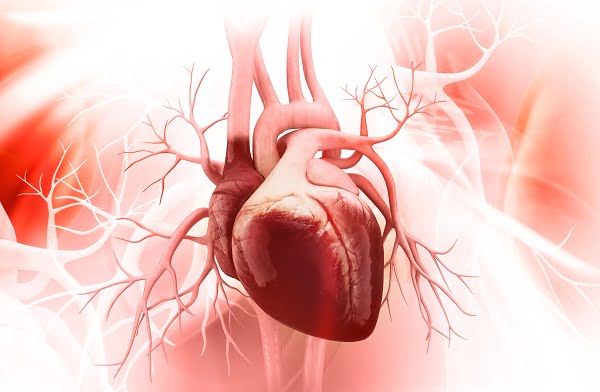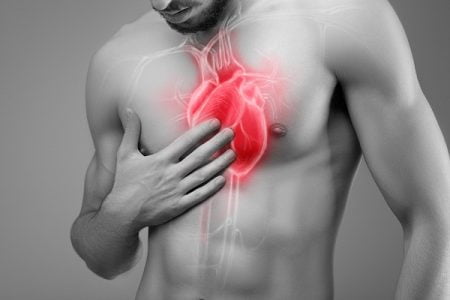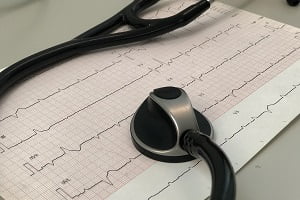Causes of Pericardial Effusion
- Updated on: Jun 7, 2024
- 4 min Read
By
- Published on Oct 3, 2019


How does excess fluid around the heart develop?
The heart is surrounded by a sac which is filled with a small amount of fluid. The fluid around the heart keeps on moving as it is continually produced and drained. This makes the level of the liquid to stay constant. But sometimes, because of some problems, the drainage part get disturbed and fluid does not drain properly as it should be.
However, the body continues to produce pericardial fluid. This leads to excess fluid or water around the heart. The condition of developing excess fluid around the heart is called pericardial effusion. The extra fluid that develops compresses the heart as the pressure inside the sac is greater than the pressure inside the heart. This pressure on the heart makes it difficult for the heart to fill blood which causes a shortage of oxygenated blood.
What are the possible causes of pericardial effusion?
The factors that cause excess fluid around the heart are given below:
Pericarditis
Pericarditis is the condition of inflammation of the pericardium (sac around the heart). It can occur after a surgery or a heart attack. The fluid in the sac keeps the layers from rubbing against each other and causing friction.
In pericarditis, the inflamed tissue of the sac can rub against the heart. This makes the membrane around the heart swollen followed by a severe chest pain.
Autoimmune disorders, such as rheumatoid arthritis or lupus
An autoimmune reaction like lupus or rheumatoid arthritis, in which the body unknowingly attacks its own cells may be the culprit of excess fluid around the heart.
Lupus triggers the inflammation of the thin sac (pericardium) surrounding the heart and eventually resulting in pericardium effusion. In rheumatoid arthritis, extra fluid may accumulate around the heart due to inflammation caused by the disease.
Spread of cancer (metastasis)
Metastatic cancers including breast cancer, lung cancer, leukemia, Hodgkin’s lymphoma and non-Hodgkin’s lymphoma are more likely to cause pericardial effusions.
Cancer of the pericardium or heart
Primary cancers (found at the site of their origin) like cancers of the heart and its lining can cause pericardial effusions. Such cancers are very rare, and most of them are benign.
Radiation therapy for cancer if the heart was within the field of radiation
Radiation can cause harm to the body like radiation to the chest can cause changes in tissues and inflammation. And radiation to the heart can lead to fluid build up.
Chemotherapy treatment for cancer
Chemotherapy is the treatment that is given to treat primary or metastatic cancers of the body. Chemotherapy leads to build up of excess fluid around the heart if the heart is in the zone of radiation. There are certain drugs used as chemotherapy medications like cyclophosphamide and doxorubicin are known to cause pericardial effusions.
Waste products in the blood due to kidney failure (uremia)
Uremia is a condition of blood poisoning by the accumulation of certain products (that are normally eliminated in the urine) in the blood. There is a correlation between the degree of uremia and development of excess fluid around the heart.
Underactive thyroid (hypothyroidism)
Pericardial effusion may result from hypothyroidism. Usually, pericardial effusion is caused by inflammation of the pericardium. And hypothyroidism is one of the main causes of inflammation of the sac around the heart.
Certain infections
Some infections are responsible for the development of extra fluid in the pericardium:
Viral infections
Viral infections are one of the main causes of the inflammation that ultimately leads to effusions. Some examples of viral infections include:
- Cytomegalovirus
- Coxsackieviruses
- Echoviruses
- HIV
Bacterial infections
Bacterial infections are more common. There are four groups that are responsible for the effusion:
- Staphylococcus aureus
- Viridans group streptococci
- Enterococci
- Coagulase-negative staphylococci
Fungal infections
Fungal infections account for about 3 to 4 percent of all cases. They typically are caused by different species including:
- Histoplasma sp.
- Aspergillus sp.
- Candida sp.
- Coccidioides immitis
Trauma or wound near the heart
Pericardial effusion result mostly from inflammation of the pericardium (pericarditis). Sometimes the inflammation is caused by an illness or injury. Due to a chest trauma:
- The flow of pericardial fluids is blocked
- Blood accumulates in the pericardium.
Both of the above conditions favor the development of excess fluid in the sac thereby giving rise to pericardial effusion.
Certain medications
Some of the prescription drugs may cause inflammation of the pericardium giving rise to pericardial effusion. Such medications include:
- Hydralazine (a medication for high blood pressure)
- Isoniazid (a tuberculosis drug)
- Phenytoin (a medication for epileptic seizures)
Pericardial effusion during pregnancy
Pericardial effusion generally affects 40 percent of healthy pregnant women. Typically, a small and clinically silent effusion develops in the third trimester of the pregnancy.
Long-term usage of cabergoline ingredient (dopamine agonists)
Cabergoline is the medicine used for stopping milk production and treating disorders caused by the overproduction of the hormone prolactin. Long-term use of this drug can cause side effects which may include:
- Heart valve disorders, such as inflammation of the pericardium
- Leaking of fluid into the sac surrounding the heart
Fluid around the heart in the elderly can also occur due to other problems and age-related complications such as due to likely infections, heart problems, etc.











